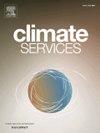Integrating social narratives of flood events into a text network analysis-based decision support framework to reduce vulnerability to climate change in Africa
IF 4
3区 环境科学与生态学
Q2 ENVIRONMENTAL SCIENCES
引用次数: 0
Abstract
In many African countries, the response to climate change is obstructed by a lack of accessible and usable information, such as localised flood maps. Compounding this, current disaster risk management systems often fail to account for context-specific drivers of social vulnerability and environmental risks, crucial for enhancing social resilience to flood impacts. This paper captures the community-based narratives of flood risk in Lusaka, Zambia. Using a well-established network from the Future Resilience for African Cities And Lands (FRACTAL) group, a cross-disciplinary approach of natural and social sciences to support decision-making for flood resilience is presented as the Participatory Climate Information Distillation for Urban Flood Resilience in Lusaka (FRACTAL-PLUS) project. Local flood inundation maps were created using global rainfall and GIS datasets and then analysed across two interactive “Learning Labs” with local stakeholders. Historical observations and lived experiences were distilled from the learning labs into three community-based social narratives of flood risk. These narratives were used to calibrate the flood maps with insights from Lusaka’s stakeholders using Natural Language Processing (NLP) and Text Network Analysis (TNA). The narrative-informed flood maps provide a dynamic entry point for enhancing stakeholder engagement by discussing social vulnerability to floods and climate change, highlighting future challenges and opportunities for resilience planning. The outputs demonstrate the value of convening stakeholders to discuss these topics in a sustainable setting for addressing the interdisciplinary challenges of climate resilience, offering a benchmark for better use of available resources and enabling a swift evaluation of needs and measures for resilience building.
将洪水事件的社会叙事整合到基于文本网络分析的决策支持框架中,以减少非洲对气候变化的脆弱性
在许多非洲国家,由于缺乏可获得和可用的信息,例如当地的洪水地图,对气候变化的反应受到阻碍。雪上加霜的是,当前的灾害风险管理系统往往无法考虑到社会脆弱性和环境风险的具体驱动因素,而这些因素对于增强社会抵御洪水影响的能力至关重要。本文捕捉了赞比亚卢萨卡以社区为基础的洪水风险叙述。利用非洲城市和土地未来恢复力(FRACTAL)小组的成熟网络,提出了一种跨学科的自然科学和社会科学方法,以支持洪水恢复力的决策,即卢萨卡城市洪水恢复力参与式气候信息蒸馏(FRACTAL- plus)项目。利用全球降雨量和GIS数据集创建了当地洪水淹没地图,然后通过两个与当地利益相关者互动的“学习实验室”进行分析。从学习实验室中提取历史观察和生活经验,形成三个以社区为基础的洪水风险社会叙事。这些叙述被用来使用自然语言处理(NLP)和文本网络分析(TNA),根据卢萨卡利益相关者的见解校准洪水地图。通过讨论社会对洪水和气候变化的脆弱性,强调未来韧性规划的挑战和机遇,以叙述为基础的洪水地图为加强利益相关者的参与提供了一个动态的切入点。产出显示了召集利益攸关方在可持续环境中讨论这些主题的价值,以应对气候适应能力的跨学科挑战,为更好地利用现有资源提供基准,并能够迅速评估适应能力建设的需求和措施。
本文章由计算机程序翻译,如有差异,请以英文原文为准。
求助全文
约1分钟内获得全文
求助全文
来源期刊

Climate Services
Multiple-
CiteScore
5.30
自引率
15.60%
发文量
62
期刊介绍:
The journal Climate Services publishes research with a focus on science-based and user-specific climate information underpinning climate services, ultimately to assist society to adapt to climate change. Climate Services brings science and practice closer together. The journal addresses both researchers in the field of climate service research, and stakeholders and practitioners interested in or already applying climate services. It serves as a means of communication, dialogue and exchange between researchers and stakeholders. Climate services pioneers novel research areas that directly refer to how climate information can be applied in methodologies and tools for adaptation to climate change. It publishes best practice examples, case studies as well as theories, methods and data analysis with a clear connection to climate services. The focus of the published work is often multi-disciplinary, case-specific, tailored to specific sectors and strongly application-oriented. To offer a suitable outlet for such studies, Climate Services journal introduced a new section in the research article type. The research article contains a classical scientific part as well as a section with easily understandable practical implications for policy makers and practitioners. The journal''s focus is on the use and usability of climate information for adaptation purposes underpinning climate services.
 求助内容:
求助内容: 应助结果提醒方式:
应助结果提醒方式:


